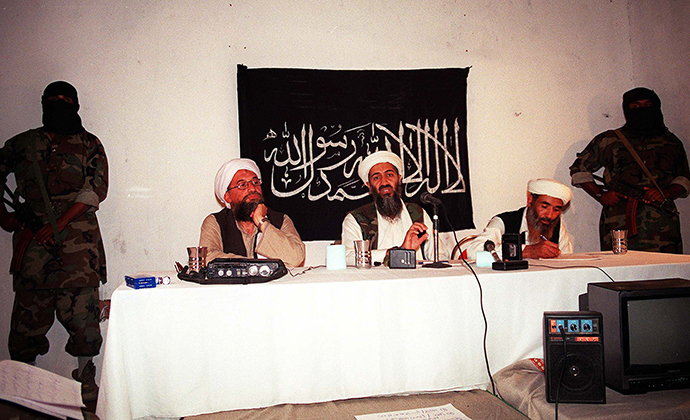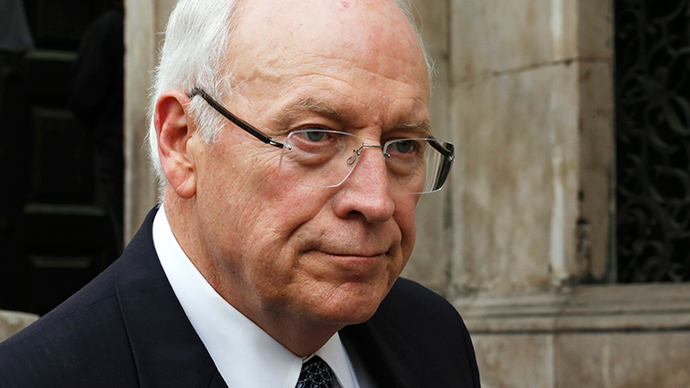Former Vice President Dick Cheney warned that the next terrorist attack on the US will be far worse than 9/11 during a nearly two-hour interview. He also took pride in the use of waterboarding and in giving the National Security Agency free reign.
The 73-year-old sat down with neoconservative political pundit Bill Kristol on Sunday for the Weekly Standard editor’s latest installment of Conversations with Bill Kristol. The two discussed Cheney's time as secretary of defense; the Gulf War; the Nixon, Ford and Reagan administrations; 9/11; and the threats we face today.
“You’ve got to be a fool to believe isolation as a strategy is the way to go. We have no choice but to be involved in that part of the world, and if we’re not actively involved, there are some very bad things that are going to happen,” Cheney warned.
He believes that if the Iranians get nuclear weapons, it won’t be long before others in the region also have nuclear weapons, hinting that the deadly weapons could fall into the heads of the Islamic State or Syria.

“So we’re in a very dangerous period. I think it’s more threatening than the period before 9/11,” the former vice president explained. “I think 9/11 will turn out to be not nearly as bad as the next mass casualty attack against the United States, which if and when it comes will be something far more deadlier than airline tickets and box cutters.”
Doomsday predictions are nothing new for the man who served under three different presidential administrations.
“While headlines about the Islamic State terrorist group given Cheney new material to work with, he's preached the need for American troops in the Middle East and predicted an eventual, epic U.S. attack for more than a decade,” Bloomberg Politics noted.
Even Cheney admitted to Kristol that he has often prognosticated on future threats.
“I gave an interview in the spring of ’01 where I talked about – I was asked about the biggest threat facing the country – and I talked about the possibility of a terrorist attack with terrorists using something deadlier, a weapon of mass destruction, for example,” he said. “That was in April.” When we got down to 9/11... we saw what they were able to do with that in terms of taking down the World Trade Center and the Pentagon and killing 3,000 of our people.”

The former Defense secretary and White House chief of staff was adamant that torture ‒ or, as he called it, “enhanced interrogation techniques” ‒ was necessary to gain the intelligence from the terrorists the US captured in the aftermath of 9/11.
“We didn’t know a lot about al Qaeda. We knew about the organization. We knew bin Laden,” he admitted. “But when we began to capture high-value detainees, especially in Afghanistan and people like Khalid Sheikh Mohammed, the mastermind of 9/11, what are you going to do, just say, ‘Please, please, pretty please, tell us what you know’? It’s not going to work. This is guy is going to die for Allah if he gets the chance and kill every American he can in the process.”
Cheney credited waterboarding and other techniques with saving American lives at home and abroad..
“[Enhanced interrogation] prevented another mass casualty attack against the United States for the next seven and a half years. And I, you know, I’m very familiar with the program, I was actively involved in helping get it started and supporting it,” he said. “And I don’t think we have any apologies to make. I think if in a similar situation today, I would do exactly the same thing.”
The second-in-command behind President George W. Bush also praised the work of the NSA with making America safer, while still protecting the civil liberties of its citizens.
“Some of the decisions we made were controversial. They are to this day. I still defend them,” he said. “Things like the terrorist surveillance program created a great flap over the NSA, and the assumption is the NSA is listening in to your phone call to Aunt Fanny. They aren’t. To my knowledge, that program has always been operated to the highest standards, very careful to protect people’s civil liberties.”
The interview ended with Cheney implying that the current presidential administration has the wrong priorities and would not be strong enough to lead the country if the far deadlier attack he predicted were to happen.
“This is not a time for us to rest on our laurels or think we can cut the defense budget and spend all that money on highways or whatever else we might want to spend it on,” he said. “We really need a strong leader, and we need somebody who can step up and remind the world what the United States is capable of and demonstrate the ability and the willingness to do that.”

